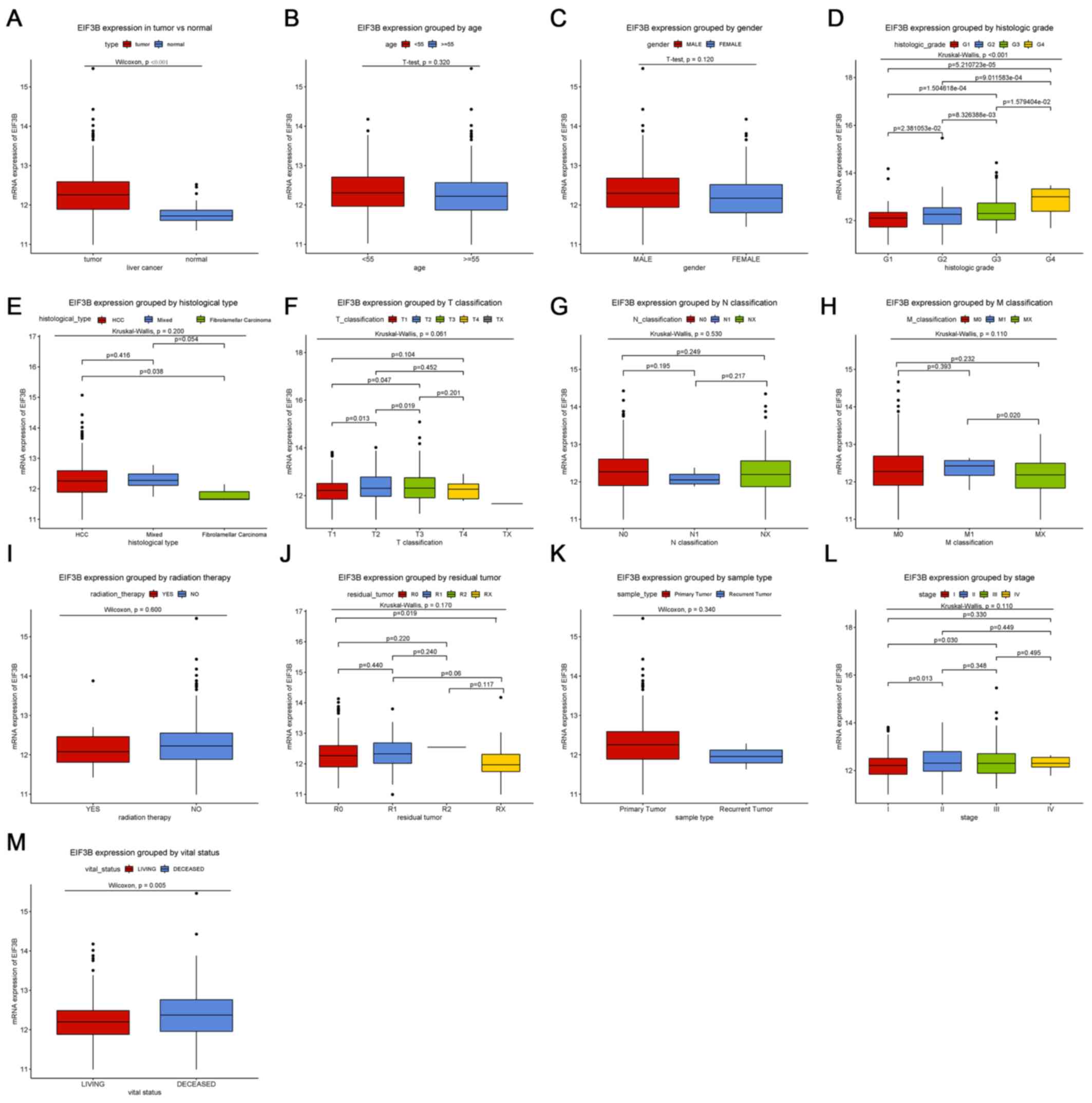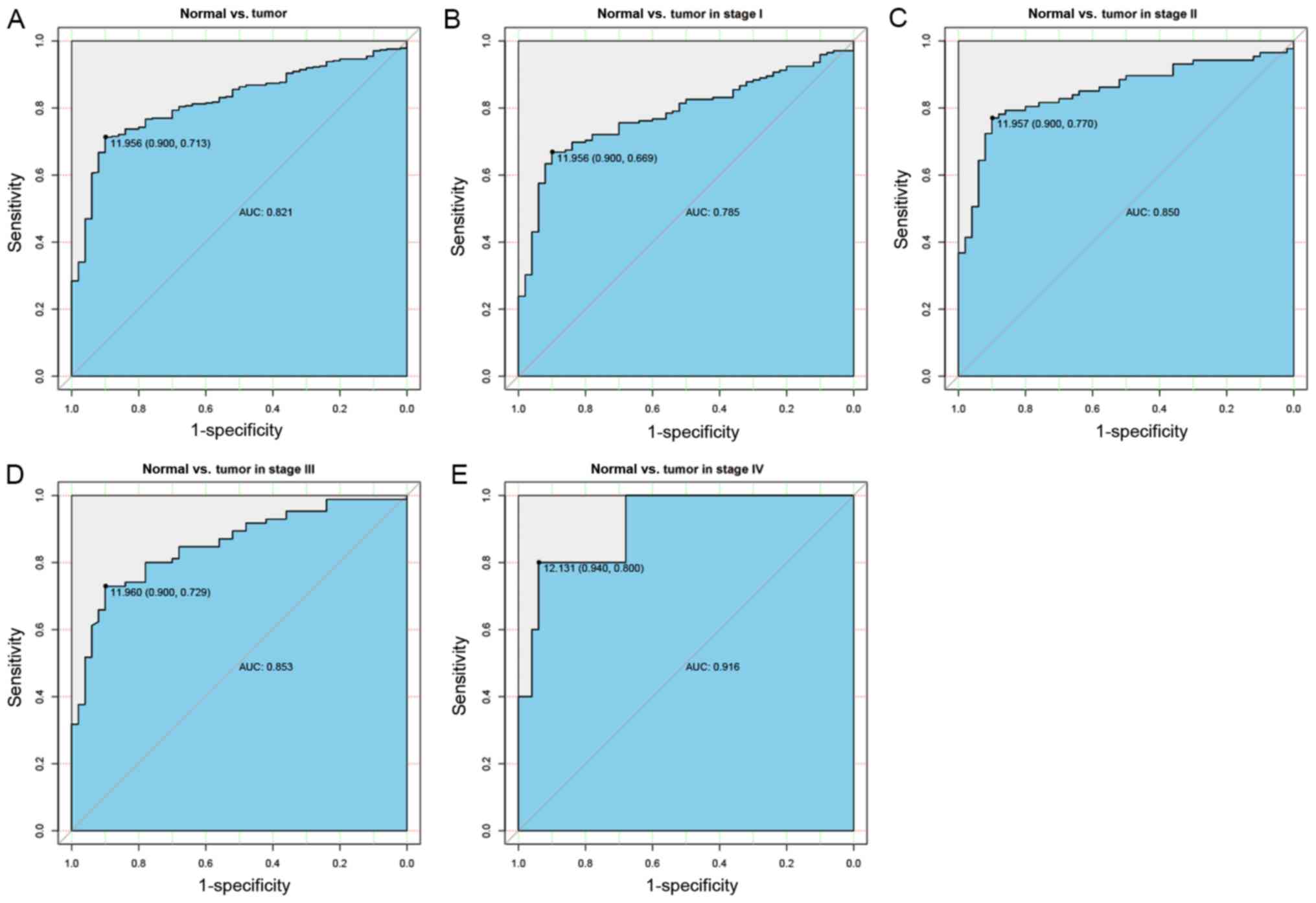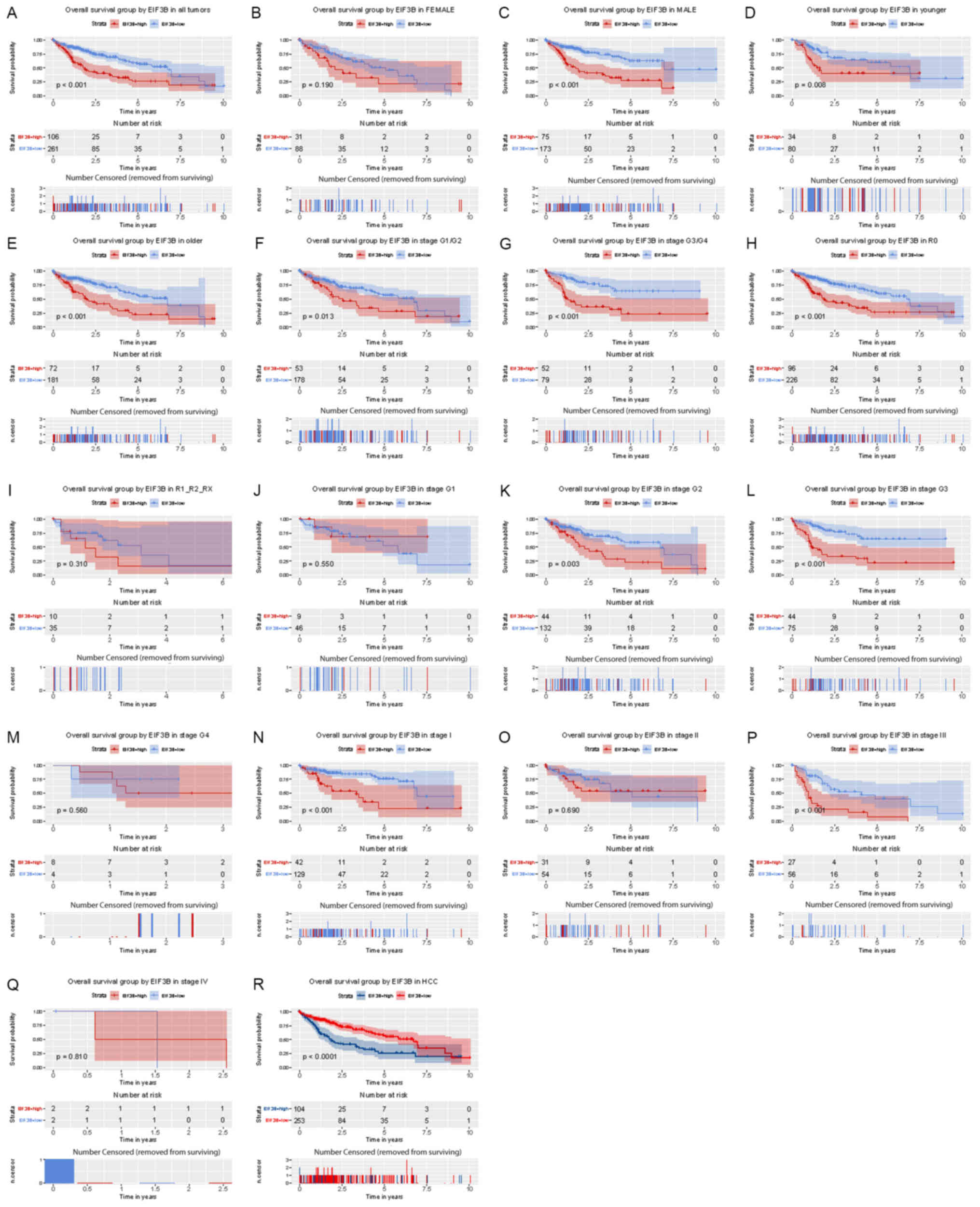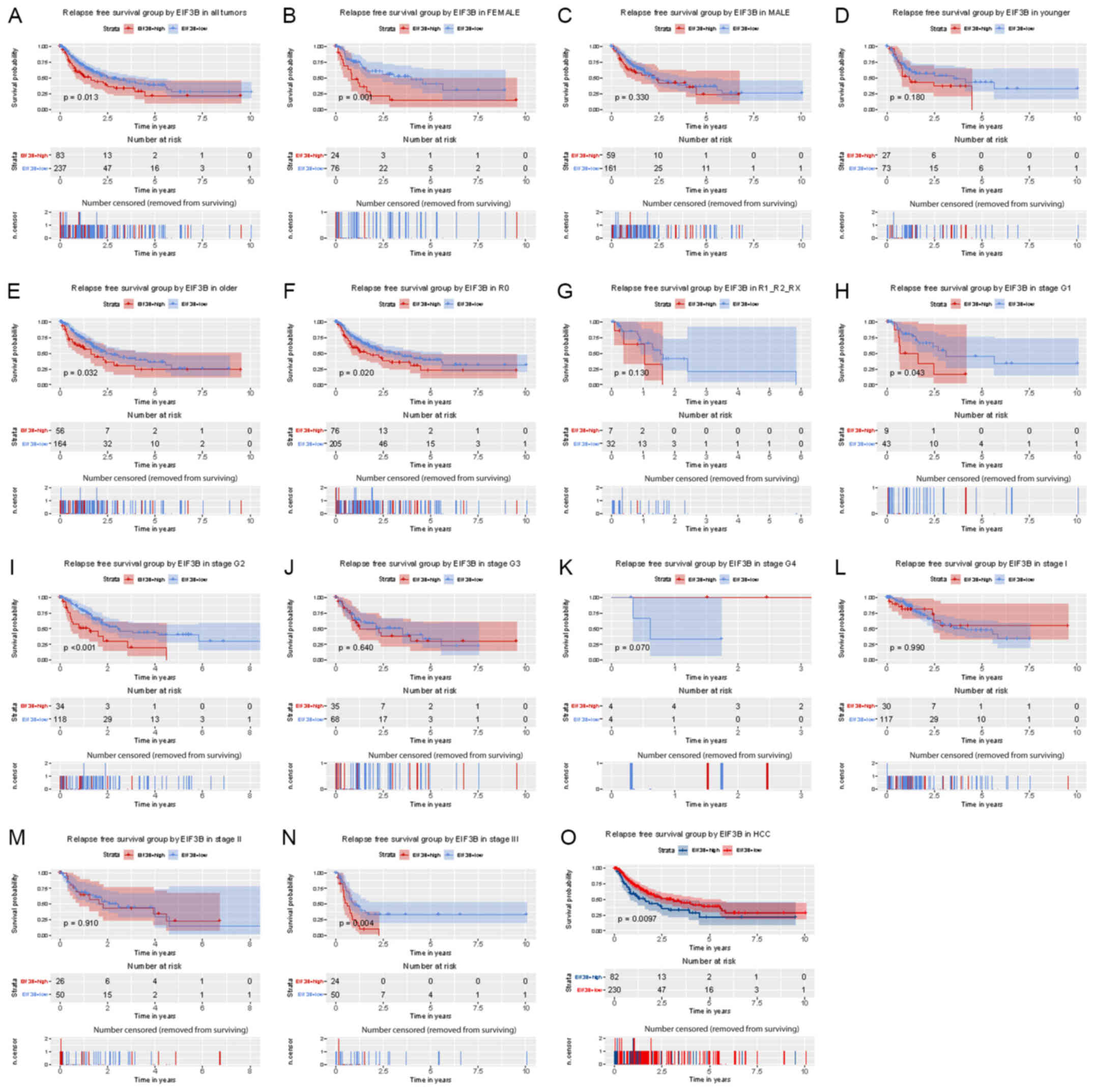|
1
|
Siegel RL, Miller KD and Jemal A: Cancer
statistics, 2019. CA Cancer J Clin. 69:7–34. 2019.PubMed/NCBI View Article : Google Scholar
|
|
2
|
Ryerson AB, Eheman CR, Altekruse SF, Ward
JW, Jemal A, Sherman RL, Henley SJ, Holtzman D, Lake A, Noone AM,
et al: Annual Report to the Nation on the Status of Cancer,
1975-2012, Featuring the Increasing Incidence of Liver Cancer.
Cancer. 122:1312–1337. 2016.PubMed/NCBI View Article : Google Scholar
|
|
3
|
Li L and Wang H: Heterogeneity of liver
cancer and personalized therapy. Cancer Lett. 379:191–197.
2016.PubMed/NCBI View Article : Google Scholar
|
|
4
|
Dawkins J and Webster RM: The
hepatocellular carcinoma market. Nat Rev Drug Discov. 18:13–14.
2019.PubMed/NCBI View Article : Google Scholar
|
|
5
|
Smith MD, Arake-Tacca L, Nitido A,
Montabana E, Park A and Cate JH: Assembly of eIF3 mediated by
mutually dependent subunit insertion. Structure. 24:886–896.
2016.PubMed/NCBI View Article : Google Scholar
|
|
6
|
Zang Y, Zhang X, Yan L, Gu G, Li D, Zhang
Y, Fang L, Fu S, Ren J and Xu Z: Eukaryotic translation initiation
factor 3b is both a promising prognostic biomarker and a potential
therapeutic target for patients with clear cell renal cell
carcinoma. J Cancer. 8:3049–3061. 2017.PubMed/NCBI View Article : Google Scholar
|
|
7
|
Xu F, Xu CZ, Gu J, Liu X, Liu R, Huang E,
Yuan Y, Zhao G, Jiang J, Xu C, et al: Eukaryotic translation
initiation factor 3B accelerates the progression of esophageal
squamous cell carcinoma by activating β-catenin signaling pathway.
Oncotarget. 7:43401–43411. 2016.PubMed/NCBI View Article : Google Scholar
|
|
8
|
Liang H, Ding X, Zhou C, Zhang Y, Xu M,
Zhang C and Xu L: Knockdown of eukaryotic translation initiation
factors 3B (EIF3B) inhibits proliferation and promotes apoptosis in
glioblastoma cells. Neurol Sci. 33:1057–1062. 2012.PubMed/NCBI View Article : Google Scholar
|
|
9
|
Wang L and Ouyang L: Effects of EIF3B gene
downregulation on apoptosis and proliferation of human ovarian
cancer SKOV3 and HO-8910 cells. Biomed Pharmacother. 109:831–837.
2019.PubMed/NCBI View Article : Google Scholar
|
|
10
|
Choi YJ, Lee YS, Lee HW, Shim DM and Seo
SW: Silencing of translation initiation factor eIF3b promotes
apoptosis in osteosarcoma cells. Bone Joint Res. 6:186–193.
2017.PubMed/NCBI View Article : Google Scholar
|
|
11
|
Tian Y, Zhao K, Yuan L, Li J, Feng S, Feng
Y, Fang Z, Li H and Deng R: EIF3B correlates with advanced disease
stages and poor prognosis, and it promotes proliferation and
inhibits apoptosis in non-small cell lung cancer. Cancer Biomark.
23:291–300. 2018.PubMed/NCBI View Article : Google Scholar
|
|
12
|
Spilka R, Ernst C, Mehta AK and Haybaeck
J: Eukaryotic translation initiation factors in cancer development
and progression. Cancer Lett. 340:9–21. 2013.PubMed/NCBI View Article : Google Scholar
|
|
13
|
Wang H, Ru Y, Sanchez-Carbayo M, Wang X,
Kieft JS and Theodorescu D: Translation initiation factor eIF3b
expression in human cancer and its role in tumor growth and lung
colonization. Clin Cancer Res. 19:2850–2860. 2013.PubMed/NCBI View Article : Google Scholar
|
|
14
|
Lin L, Holbro T, Alonso G, Gerosa D and
Burger MM: Molecular interaction between human tumor marker protein
p150, the largest subunit of eIF3, and intermediate filament
protein K7. J Cell Biochem. 80:483–490. 2001.PubMed/NCBI View Article : Google Scholar
|
|
15
|
Golob-Schwarzl N, Krassnig S, Toeglhofer
AM, Park YN, Gogg-Kamerer M, Vierlinger K, Schröder F, Rhee H,
Schicho R, Fickert P and Haybaeck J: New liver cancer biomarkers:
PI3K/AKT/mTOR pathway members and eukaryotic translation initiation
factors. Eur J Cancer. 83:56–70. 2017.PubMed/NCBI View Article : Google Scholar
|
|
16
|
Team RDCJCR. A language and environment
for statistical computing. R Foundation for Statistical Computing,
Vienna, Austria. 14:12–21. 2009. View Article : Google Scholar
|
|
17
|
Wickham H: Ggplot2: Elegant graphics for
data analysis. J R Stat Soc. 174:245–246. 2011.
|
|
18
|
Robin X, Turck N, Hainard A, Tiberti N,
Lisacek F, Sanchez JC and Müller M: pROC: An open-source package
for R and S+ to analyze and compare ROC curves. BMC Bioinformatics.
12(77)2011.PubMed/NCBI View Article : Google Scholar
|
|
19
|
Therneau TM and Grambsch PM: Modeling
survival data: Extending the Cox model. Springer, New York,
2000.
|
|
20
|
Subramanian A, Tamayo P, Mootha VK,
Mukherjee S, Ebert BL, Gillette MA, Paulovich A, Pomeroy SL, Golub
TR, Lander ES and Mesirov JP: Gene set enrichment analysis: A
knowledge-based approach for interpreting genome-wide expression
profiles. Proc Natl Acad Sci USA. 102:15545–15550. 2005.PubMed/NCBI View Article : Google Scholar
|
|
21
|
Cronin KA, Lake AJ, Scott S, Sherman RL,
Noone AM, Howlader N, Henley SJ, Anderson RN, Firth AU, Ma J, et
al: Annual report to the nation on the status of cancer, part I:
National cancer statistics. Cancer. 124:2785–2800. 2018.PubMed/NCBI View Article : Google Scholar
|
|
22
|
Xu N, Liu YN, Yin P, Wang LJ, Dou YS, Yang
WJ and Zhou MG: Impact of liver cancer deaths on life expectancy in
14 counties (districts) from the Huai River Basin, 2013:
Relationship between the water environment and liver cancer.
Zhonghua Yu Fang Yi Xue Za Zhi. 50:629–633. 2016.PubMed/NCBI View Article : Google Scholar : (In Chinese).
|
|
23
|
Tu T, Bühler S and Bartenschlager R:
Chronic viral hepatitis and its association with liver cancer. Biol
Chem. 398:817–837. 2017.PubMed/NCBI View Article : Google Scholar
|
|
24
|
Chen YJ, Wallig MA and Jeffery EH: Dietary
broccoli lessens development of fatty liver and liver cancer in
mice given diethylnitrosamine and fed a western or control diet. J
Nutr. 146:542–550. 2016.PubMed/NCBI View Article : Google Scholar
|
|
25
|
Global Burden of Disease Cancer
Collaboration. Fitzmaurice C, Akinyemiju TF, Al Lami FH, Alam T,
Alizadeh-Navaei R, Allen C, Alsharif U, Alvis-Guzman N, Amini E, et
al: Global, regional, and national cancer incidence, mortality,
years of life lost, years lived with disability, and
disability-adjusted life-years for 29 cancer groups, 1990 to 2016:
A systematic analysis for the global burden of disease study. JAMA
Oncol. 4:1553–1568. 2018.PubMed/NCBI View Article : Google Scholar
|
|
26
|
Jiao Y, Fu Z, Li Y, Meng L and Liu Y: High
EIF2B5 mRNA expression and its prognostic significance in liver
cancer: A study based on the TCGA and GEO database. Cancer Manag
Res. 10:6003–6014. 2018.PubMed/NCBI View Article : Google Scholar
|
|
27
|
Jiao Y, Fu Z, Li Y, Zhang W and Liu Y:
Aberrant FAM64A mRNA expression is an independent predictor of poor
survival in pancreatic cancer. PLoS One.
14(e0211291)2019.PubMed/NCBI View Article : Google Scholar
|
|
28
|
Jiao Y, Li Y, Lu Z and Liu Y: High
trophinin-associated protein expression is an independent predictor
of poor survival in liver cancer. Dig Dis Sci. 64:137–143.
2019.PubMed/NCBI View Article : Google Scholar
|
|
29
|
Jiao Y, Li Y, Fu Z, Hou L, Chen Q, Cai Y,
Jiang P, He M and Yang Z: OGDHL expression as a prognostic
biomarker for liver cancer patients. Dis Markers.
2019(9037131)2019.PubMed/NCBI View Article : Google Scholar
|
|
30
|
Jiao Y, Li Y, Jiang P, Han W and Liu Y:
PGM5: A novel diagnostic and prognostic biomarker for liver cancer.
PeerJ. 7(e7070)2019.PubMed/NCBI View Article : Google Scholar
|
|
31
|
Jiao Y, Li Y, Liu S, Chen Q and Liu Y:
ITGA3 serves as a diagnostic and prognostic biomarker for
pancreatic cancer. Onco Targets Ther. 12:4141–4152. 2019.PubMed/NCBI View Article : Google Scholar
|
|
32
|
Li Y, Jiao Y, Fu Z, Luo Z, Su J and Li Y:
High miR-454-3p expression predicts poor prognosis in
hepatocellular carcinoma. Cancer Manag Res. 11:2795–2802.
2019.PubMed/NCBI View Article : Google Scholar
|
|
33
|
Li Y, Jiao Y, Li Y and Liu Y: Expression
of La ribonucleoprotein domain family member 4B (LARP4B) in liver
cancer and their clinical and prognostic significance. Dis Markers.
2019(1569049)2019.PubMed/NCBI View Article : Google Scholar
|
|
34
|
Li Y, Jiao Y, Luo Z, Li Y and Liu Y: High
peroxidasin-like expression is a potential and independent
prognostic biomarker in breast cancer. Medicine (Baltimore).
98(e17703)2019.PubMed/NCBI View Article : Google Scholar
|
|
35
|
Zhang X, Cui Y, He M, Jiao Y and Yang Z:
Lipocalin-1 expression as a prognosticator marker of survival in
breast cancer patients. Breast Care, 2019.
|
|
36
|
Cui Y, Jiao Y, Wang K, He M and Yang Z: A
new prognostic factor of breast cancer: High carboxyl ester lipase
expression related to poor survival. Cancer Genet. 239:54–61.
2019.PubMed/NCBI View Article : Google Scholar
|
|
37
|
Hou L, Zhang X, Jiao Y, Li Y, Zhao Y, Guan
Y and Liu Z: ATP binding cassette subfamily B member 9 (ABCB9) is a
prognostic indicator of overall survival in ovarian cancer.
Medicine (Baltimore). 98(e15698)2019.PubMed/NCBI View Article : Google Scholar
|
|
38
|
Cai H, Jiao Y, Li Y, Yang Z, He M and Liu
Y: Low CYp24A1 mRNA expression and its role in prognosis of breast
cancer. Sci Rep. 9(13714)2019.PubMed/NCBI View Article : Google Scholar
|
|
39
|
Ma F, Li X, Ren J, Guo R, Li Y, Liu J, Sun
Y, Liu Z, Jia J and Li W: Downregulation of eukaryotic translation
initiation factor 3b inhibited proliferation and metastasis of
gastric cancer. Cell Death Dis. 10(623)2019.PubMed/NCBI View Article : Google Scholar
|
|
40
|
Ladu S, Calvisi DF, Conner EA, Farina M,
Factor VM and Thorgeirsson SS: E2F1 inhibits c-Myc-driven apoptosis
via pIK3CA/Akt/mTOR and COX-2 in a mouse model of human liver
cancer. Gastroenterology. 135:1322–1332. 2008.PubMed/NCBI View Article : Google Scholar
|
|
41
|
Xin B, Yamamoto M, Fujii K, Ooshio T, Chen
X, Okada Y, Watanabe K, Miyokawa N, Furukawa H and Nishikawa Y:
Critical role of Myc activation in mouse hepatocarcinogenesis
induced by the activation of AKT and RAS pathways. Oncogene.
36:5087–5097. 2017.PubMed/NCBI View Article : Google Scholar
|
|
42
|
Li X, Wu Q, Bu M, Hu L, Du WW, Jiao C, Pan
H, Sdiri M, Wu N, Xie Y and Yang BB: Ergosterol peroxide activates
Foxo3-mediated cell death signaling by inhibiting AKT and c-Myc in
human hepatocellular carcinoma cells. Oncotarget. 7:33948–33959.
2016.PubMed/NCBI View Article : Google Scholar
|
|
43
|
Barnes JL, Zubair M, John K, Poirier MC
and Martin FL: Carcinogens and DNA damage. Biochem Soc Trans.
46:1213–1224. 2018.PubMed/NCBI View Article : Google Scholar
|



















